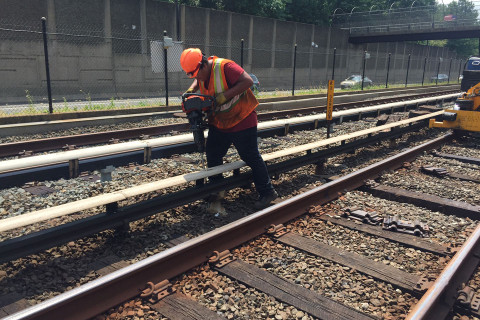WASHINGTON — Even as Metro needs billions of dollars worth of repairs and a dedicated funding source just to keep the trains running, the transit agency’s struggles have devolved into what Virginia’s governor called “goofy, naive, political theater.”
Terry McAuliffe’s comments were part of a nasty exchange Wednesday between Virginia officials and those from D.C. who serve on Metro’s board over funding and governance.
In an apparent effort to pressure Virginia to contribute more money to Metro, D.C. Metro Board member Corbett Price this week suggested that Metro should try to kill the second phase of the Silver Line, which is nearly half finished. The line will eventually connect Dulles International Airport to the current end of the line in Reston.
Metro board chair and D.C. Councilmember Jack Evans stood by Price’s comments at a regional transportation event Wednesday morning.
“Metro’s not paying for the Silver Line, but they’re going to turn it over to us and it’s going to cost us hundreds of millions of dollars to operate when we don’t have any money at all,” Evans said.
In front of an audience of business leaders, Virginia Transportation Secretary said that the Silver Line would be built, saying any suggestion otherwise is just political rhetoric.
“In terms of all the rhetoric coming out of the board, we believe (General Manager Paul Wiedefeld) is the one that brings the most credibility to that. When he’s in front of the legislature … it’s not political rhetoric, it’s not anything other than standing out exactly what we need,” Layne said.
Speaking on WTOP’s “Ask the Governor” show, McAuliffe said the Silver Line suggestion showed that the Metro board “is a joke. Plain and simple.” He said if funding for the Silver Line were really an issue, Metro would have made that call years ago.
McAuliffe said he could say when Virginia might offer more funding. He wants to see a complete long-term plan that details total costs before he would consider asking his legislators to support sending more money to the ailing transit system.
Metro said this week that it might not have such a detailed plan available until 2018. But transit agency officials estimate that roughly $25 billion in repairs and improvements will be needed in the next decade.
“How much is it going to cost?” McAuliffe said. “I understand that we need to put money up for a dedicated funding source. I get that. I understand it. But for all this foolishness and naiveté from these board members, who are just yakking in the press, who don’t have a clue as to what they’re talking about, is not helpful.”
Jurisdictional squabbling has caused problems in the past, and has been blamed in part for leaving Metro in the deteriorated state it is in today after basic maintenance and critical safety inspections were put off for years.
McAuliffe also said he wants a change to the Metro board’s 16-member structure. He also wants to see more transit experts and fewer politicians be appointed to the board.
Maryland Transportation Secretary Pete Rahn, who tried to stay out of the fray over the Silver Line, said although changes to the board and governance structure would be nice, the huge obstacles to changing the Metro Compact mean it is not the best use of time while Metro faces such serious challenges.
“Let’s face it: This is a very complex structure,” Rahn said. “You can see the difficulty of three jurisdictions trying to come together for very complicated issues.”
Rahn believes the current system can work if the Metro board and managers stay focused. But he said he would appreciate hearing about Metro’s financial and other needs through proper channels rather than through the media.
At an event marking one year since he took over Metro, General Manager Paul Wiedefeld said that the Silver Line is a “great addition to the system” and that it should go ahead as planned.
Meanwhile, Wiedefeld announced a new plan dubbed “Back 2 Good” that includes night and weekend track work plus his proposals to cut service hours and raise fares. He promised to focus on rider delays and satisfaction as a measure of whether the additional track work, station cleaning and rail car maintenance planned for the next year are effective.
“Here we are in the nation’s capital with all the visitors we have from around the world, and we have a system that we’re not very proud of. And I think that’s a disgrace,” Wiedefeld said.





